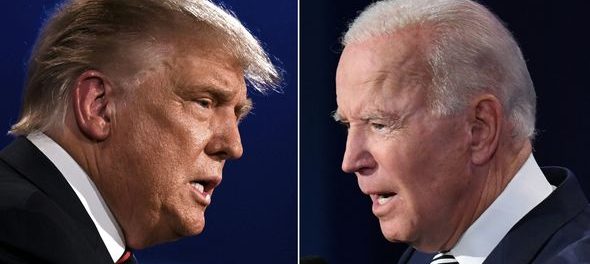US PRESIDENTIAL ELECTIONS IS THERE RELEVANCE TO THE CARIBBEAN?
Get our headlines on WHATSAPP: 1) Save +1 (869) 665-9125 to your contact list. 2) Send a WhatsApp message to that number so we can add you 3) Send your news, photos/videos to times.caribbean@gmail.com

by Tony Nias
In a matter of days, on November 3, the American electorate will head to the polls to officially cast its vote for the next President of the United States (US).
The choice for voters in this 59th quadrennial presidential election is between the incumbent Republican president Donald Trump, and Democratic nominee, and former Vice President, Joe Biden.
Early voting numbers indicate that Americans believe that the stakes are extremely high in 2020, consequently the keen interest is expected to result in turnout surpassing that of 2016.
The Americans are not the only ones interested in the US presidential election. The rest of the world looks on with interest in the outcome, albeit for differing reasons.
In the Caribbean, every four years on election night, we are glued to our television sets, or whatever electronic device we can access, some even make it into a gathering of family and friends, and prepare for a long night dubbed “election watch.” The fact is, we do have a vested interest in who determines US government policy making.
To the casual onlooker, the fact that the Caribbean would take such interest in US presidential elections may seem strange. Especially considering that with the exception of the Venezuela crisis, and concern over China’s growing influence in the Caribbean region, the geopolitical significance to US policymakers has been on the decline.
Indeed, in this election cycle, Caribbean people may point to pride as a reason to be invested in the US election; Joe Biden’s Vice Presidential nominee, current US Senator Kamala Harris, is of Jamaican descent.
However, further analyses would reveal that the US presidential election results may significantly impact the livelihoods of Caribbean people. The US is much more that just a super power located to our north. The fact that the US is home to the region’s largest diaspora, makes it significant as our main source of remittance. Further, it is also our largest trading partner, provides some development assistance, and since most of our economies are so heavily dependent on tourism, the US represents a most important source market.
Caribbean people are fully aware that elections have consequences, they understand that the candidates policy positions may not necessarily match the region’s interests. Indeed no position will be a perfect fit, they would have to settle for the best deal.
President Trump and former VP Joe Biden generally differ significantly in their stated approaches to a number of issues important to the region, namely; foreign policy, trade, immigration, race relations, and economic policy. Both candidates have made campaign promises, but beyond that they both have records, Trump has been President, while Biden has been Vice President and a US Senator.
When it comes to foreign and trade policy, President Trump for his part has made it clear where he stands, he is a nationalist, unilateral, and has an ‘America first’ outlook. Since taking office he has escalated trade tensions, and withdrawn from a number of critical international organizations, including the World Health Organization (WHO), and the World Trade Organization (WTO)
Joe Biden, on the other hand may at first glance seem to represent a more traditional US foreign policy, promoting multilateral-ism, more supportive of the WTO, which aligns with the interest of Caribbean countries. He has signaled his intention to rejoin these organizations if elected. However, let us hold the applause for Biden, since his trade policy, although more predictable and stable than his opponent, appeals to the crucial voting bloc of blue collar workers in the US who feel hurt by globalization.
The reality is all politics is local, therefore we should not expect that there will be the wide open-armed embrace of free trade under the Biden administration.
There is no doubt that the outcome of this high-stakes US presidential election will have implications for US government policy making on issues consequential for the Caribbean.
The only certainty about the upcoming US Presidential elections is that one of two candidate with diametrically opposite policy positions will emerge as the next President of the United States.
While we may be tempted to argue that one candidate or the other may appear generally better aligned with Caribbean interests, let us not suggest that a Biden or Trump win will automatically be a net positive for the region. The extent to which any winning candidate can advance his legislative agenda will be largely determined by whether his party control the legislative branch. A hostile Congress can block any President’s legislative agenda. This reality makes it even more important that Caribbean-Americans vote as if this election has consequence, because it does.
Leave a comment
You must be logged in to post a comment.